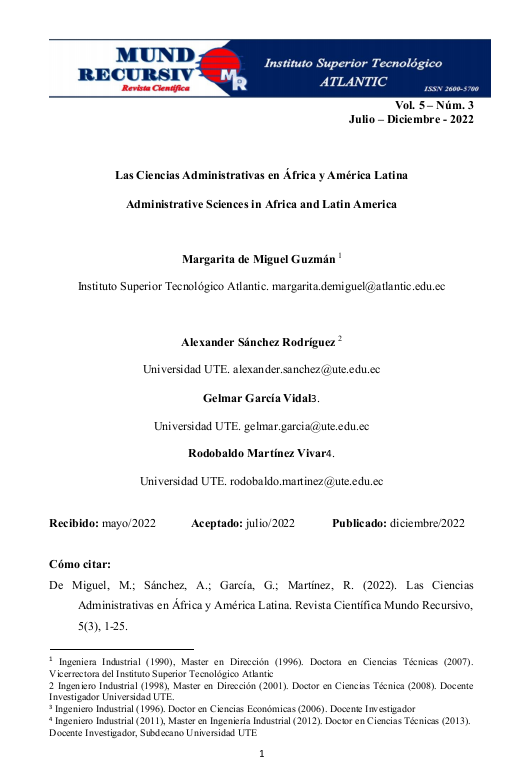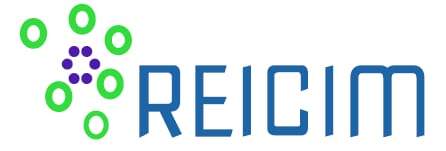Administrative Sciences in Africa and Latin America
Keywords:
Administrative Sciences, Africa, Latin AmericaAbstract
Characterizing the existing situation in a given topic must always be a key step in order to design actions to improve a position to be transformed. In accordance with this premise, this research presents a comparative analysis of the research carried out by administrative science researchers in the Latin American and African regions. For this purpose, an analysis of the publications on Administrative Sciences by researchers from the continent reported in Scopus is carried out. After an initial review of 100% of these publications, work is carried out with about 87% of these, defining the functions or areas of knowledge where they are developed, it is also analyzed, the evolution over time and the sectors and countries where they are developed and applied. In addition, some elements related to the collaboration links between the countries are characterized based on the development of the research, the main journals where the research results have been published and the behavior of the authors with the largest number of publications.
References
Aguilar-Gordon y Heredia-Guzman (2019). Fundamentos y desafíos de la calidad en la educación superior ecuatoriana. Aseguramiento de la calidad de la educación superior. Debates y experiencias. CACES. ISBN 978-9942-8665-3-4. 227pp.
Baldwin, A., Shen, G. Q., & Brandon, P. (2009). Introduction: Collaborative construction information management - evolution and revolution. [Editorial]. Collaborative Construction Information Management, 9780203883631, 1-17. doi: 10.4324/9780203883631
Batista-dos-Santos, A. C., De Alloufa, J. M. L., & Nepomuceno, L. H. (2010). Epistemology and methodology for critical researches in management: Approximate readings of Horkheimer and Adorno. [Article]. RAE Revista de Administracao de Empresas, 50(3), 312-324. doi: 10.1590/s0034-75902010000300007
da Costa, A. S. M., Barros, D. F., & Martins, P. E. M. (2010). Historical perspective in management: New objects, new problems, new approaches. [Article]. RAE Revista de Administracao de Empresas, 50(3), 288-299. doi: 10.1590/s0034-75902010000300005
Felix, R. (2003). A Proposed Taxonomy of Management Systems. [Article]. Systems Research and Behavioral Science, 20(1), 21-29. doi: 10.1002/sres.523
Felzensztein, C., Crick, D., Gonzalez-Perez, M. A., Jurado, T., & Etchebarne Lopez, M. S. (2020). Capabilities and the internationalisation of smaller-sized, service-oriented firms in the southern hemisphere. [Article]. Journal of Strategic Marketing. doi: 10.1080/0965254x.2020.1815235
Guerra Betancourt, K., de Zayas Pérez, M. R., & González Guitián, M. V. (2013). Bibliometric analysis of publications related to innovation projects and their management in Scopus, 2001-2011. [Article]. Revista Cubana de Informacion en Ciencias de la Salud, 24(3), 281-294.
Hamid, S. R., Isa, S., Chew, B. C., & Altun, A. (2019). Quality Management Evolution from the Past to Present: Challenges for Tomorrow. [Article]. Organizacija, 52(3), 157-186. doi: 10.2478/orga-2019-0011
Ibarra-Colado, E. (2008). Is there any future for critical management studies in Latin America? Moving from epistemic coloniality to 'trans-discipline'. [Article]. Organization, 15(6), 932-935. doi: 10.1177/1350508408095822
Jurado, J. C. J. (2018). Authority. Conceptual implications in management theories. [Article]. Cuadernos de Administracion, 31(56), 81-104. doi: 10.11144/Javeriana.cao.31-56.adcta
Juran, J. M. (2002). Quality glossary will benefit many [5]. [Letter]. Quality Progress, 35(10), 12.
Obedgiu, V. (2017). Human resource management, historical perspectives, evolution and professional development. [Review]. Journal of Management Development, 36(8), 986-990. doi: 10.1108/jmd-12-2016-0267
Oliveira, R. R., & Martins, H. C. (2019). Project management office performance: Divergence of the perceptions between academic instruction and professional experience. [Article]. Innovar, 30(75), 119-134. doi: 10.15446/innovar.v30n75.83261
Ormazabal, M., Rich, E., Sarriegi, J. M., & Viles, E. (2017). Environmental Management Evolution Framework: Maturity Stages and Causal Loops. [Article]. Organization and Environment, 30(1), 27-50. doi: 10.1177/1086026615623060
Paucar-Caceres, A., & Jerardino-Wiesenborn, B. (2020). A bridge for two views: Checkland’s soft systems methodology and Maturana’s ontology of the observer. [Article]. Journal of the Operational Research Society, 71(4), 660-672. doi: 10.1080/01605682.2019.1578629
Queiroz, M. M., Fosso Wamba, S., Machado, M. C., & Telles, R. (2020). Smart production systems drivers for business process management improvement: An integrative framework. [Article]. Business Process Management Journal, 26(5), 1075-1092. doi: 10.1108/bpmj-03-2019-0134
Shen, W., Hu, D., Günay, E. E., & Okudan Kremer, G. E. (2020). Evolution of supply chain management: A sustainability focused review. [Article]. International Journal of Sustainable Manufacturing, 4(2-4), 319-335. doi: 10.1504/ijsm.2020.107131
Silva, F. P., De Freitas, L. S., Cândido, G. A., Santos, D. B., Santos, D. A. S., & Macedo, L. O. B. (2016). Theoretical models of corporate social responsibility and corporate social performance: An analysis from the decade 1950-2000. [Article]. Espacios, 37(2).
Thaichon, P., Liyanaarachchi, G., Quach, S., Weaven, S., & Bu, Y. (2019). Online relationship marketing: evolution and theoretical insights into online relationship marketing. [Article]. Marketing Intelligence and Planning, 38(6), 676-698. doi: 10.1108/mip-04-2019-0232
Wu, W., Liang, Z., Zhang, Q., & Zhang, H. (2020). Coupling relationships and synergistic mechanisms between technology management capability and technological capability in product innovation: a simulation study. [Article]. Technology Analysis and Strategic Management, 32(9), 1098-1112. doi: 10.1080/09537325.2020.1743261
Zanon, L. G., Ulhoa, T. F., & Esposto, K. F. (2020). Performance measurement and lean maturity: congruence for improvement. [Article]. Production Planning and Control. doi: 10.1080/09537287.2020.1762136










